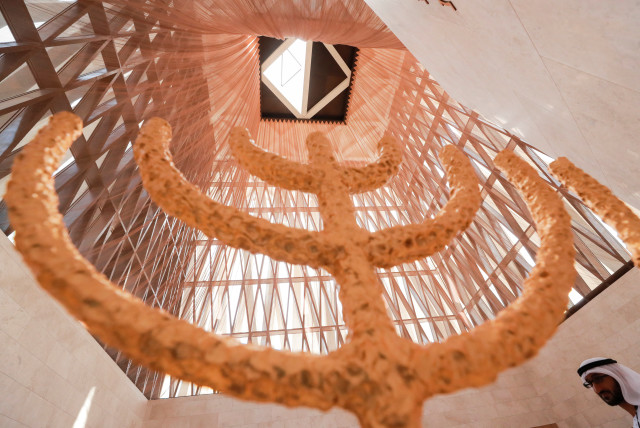YU president headlines historic interfaith sustainability panel in UAE

This event, according to the AFH, was the first of its kind in the United Arab Emirates in which Jews, Muslims, and Christians discussed the issue of sustainability.
Abu Dhabi's Abrahamic Family House (AFH) kicked off its first year of programming on Thursday with a panel entitled, "Rethinking Sustainability and Peace Through a Spiritual Lens," headlined by Yeshiva University President Rabbi Dr. Ari Berman.
This event, according to the AFH, was the first of its kind in the United Arab Emirates in which Jews, Muslims, and Christians discussed the issue of sustainability.
“As a representative of our multi-millennia tradition, I’m honored to draw on the time- tested roots of the Jewish faith to address the universal challenges of tomorrow,” said President Berman. “Yeshiva University is proud to participate in this historic opportunity and continue our work of bringing the Jewish voice into the global moral conversation.”
The other panelists at the event were: Dr. Monica Menendez, Associate Dean of Engineering for Graduate Affairs at NYU Abu Dhabi; and Rabbi David Rosen, Special Advisor for Interfaith and Jewish Affairs to the Abrahamic Family House.
The Abrahamic Family House's purpose and mission
The Abrahamic Family House, inaugurated in February, contains houses of worship for the three Abrahamic faiths: A synagogue, a mosque, and a church.
The synagogue is the first purpose-built Jewish house of worship in the UAE.
Each house of worship was carefully designed, incorporating traditional materials and architecture used in all three faiths. The church’s altar is pointing east, the mosque pointed toward the Kaaba in Mecca and the synagogue bimah (a raised platform with a reading desk for reading the Torah) and Torah scrolls faced towards Jerusalem.
The AFH website explained that the “synagogue presents a series of architectural thresholds that culminate in a shrouded, sanctified, built representation of communal prayer. The multi-layered facade of the synagogue recalls the Jewish Sukkot festival, where palm trees are harvested and communities build tents in their gardens as designated areas for gathering and eating.”
Zvika Klein contributed to this report.
The Environment and Climate Change portal is produced in cooperation with the Goldman Sonnenfeldt School of Sustainability and Climate Change at Ben-Gurion University of the Negev. The Jerusalem Post maintains all editorial decisions related to the content.
Jerusalem Post Store
`; document.getElementById("linkPremium").innerHTML = cont; var divWithLink = document.getElementById("premium-link"); if (divWithLink !== null && divWithLink !== 'undefined') { divWithLink.style.border = "solid 1px #cb0f3e"; divWithLink.style.textAlign = "center"; divWithLink.style.marginBottom = "15px"; divWithLink.style.marginTop = "15px"; divWithLink.style.width = "100%"; divWithLink.style.backgroundColor = "#122952"; divWithLink.style.color = "#ffffff"; divWithLink.style.lineHeight = "1.5"; } } (function (v, i) { });

